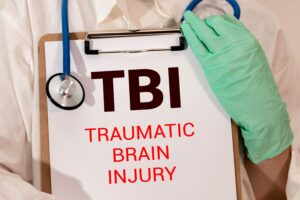How Much Will I Get for Pain and Suffering After a TBI?
Traumatic brain injuries (TBIs) often occur in motor vehicle collisions due to sudden impacts, causing the brain to collide with the skull. TBIs can happen in various ways, such as from hitting the steering wheel or being jolted during a crash. Compensation for pain and suffering from a TBI can vary widely, typically ranging from thousands to millions of dollars, depending on the injury’s severity and its effect on an accident victim’s daily life.
A skilled North Port TBI lawyer can gather evidence for your case, negotiate with insurance companies, and ensure that all aspects of your suffering are considered. They can also assess the full extent of your damages, advocate for your rights, and work to obtain the full compensation you deserve for your TBI.
North Port TBI Guide
- Types of Accidents That Cause TBIs
- Common Types of Medical Treatment for TBIs
- Proving the Elements of a Motor Vehicle Accident Case Involving a TBI
- Recoverable Pain and Suffering Compensation for a TBI
- Successfully Litigating a Personal Injury Case Involving a TBI
- Talk with an Experienced Personal Injury Attorney Today
Types of Accidents That Cause TBIs
TBIs can result from various types of accidents, often due to the negligence of others.
Car accidents are one of the most common causes of TBIs. When drivers fail to follow traffic laws, such as by speeding or driving under the influence, they increase the likelihood of collisions. A sudden impact can cause the brain to jolt within the skull, leading to concussions or more severe injuries.
Truck accidents pose a greater risk due to the sheer size and weight of commercial vehicles. When truck drivers neglect safety regulations, such as adhering to weight limits or driving long hours without rest, they can create hazardous situations on the road. The impact from a truck can be catastrophic, often resulting in severe TBIs for occupants of smaller vehicles.
Pedestrian accidents also highlight negligence on the part of drivers. Distracted driving, such as texting while behind the wheel, can lead to collisions with pedestrians crossing streets. The injuries sustained in these accidents can be devastating because pedestrians lack the protection that vehicles provide. TBIs are common among pedestrians struck by cars, especially when the impact occurs at high speeds.
Motorcycle accidents are also frequently linked to negligent driving behaviors. Motorcyclists are particularly vulnerable because they lack the safety features found in cars. When drivers fail to see motorcyclists or make sudden lane changes without checking blind spots, the consequences can be dire. A fall or collision can lead to significant head injuries, even if the rider is wearing a helmet.
Bicycle accidents are similarly dangerous, especially in urban environments where cyclists share the road with vehicles. Negligent actions by drivers, such as opening car doors without checking for cyclists or failing to yield at intersections, can result in serious accidents. Even with safety gear, cyclists can suffer from TBIs when a vehicle strikes them.
Finally, bus accidents, which may involve school buses or public transportation, can cause significant harm. When bus drivers operate recklessly or fail to adhere to safety protocols, passengers can become seriously injured. The large number of individuals on board increases the potential for traumatic brain injuries.
Common Types of Medical Treatment for TBIs

TBIs sustained in motor vehicle crashes can vary significantly in severity and type, requiring a range of medical treatments.
- Initially, emergency medical care is vital. Upon arrival at the hospital, patients may undergo imaging tests, such as CT scans or MRIs, to assess the extent of the injury. These scans help identify bleeding, swelling, or fractures in the skull, which are critical for determining the next steps in treatment.
- For concussions, which are likely the most common type of TBI, treatment may involve rest and monitoring. Accident victims are typically advised to limit physical and cognitive activities to promote healing. Over-the-counter pain relievers like acetaminophen can help manage headaches, while medical professionals may recommend follow-up appointments to monitor recovery.
- In cases of moderate to severe TBIs, more intensive treatments are often required. If there is significant bleeding or swelling, neurosurgery may be necessary, which can involve procedures to relieve pressure on the brain or repair skull fractures. Sometimes, a craniotomy is performed, where a section of the skull is removed to allow for swelling or to address bleeding.
- Following surgery, rehabilitation becomes a vital part of the recovery process and may include physical therapy to improve motor skills and strength, occupational therapy to assist with daily activities, and speech therapy if language or communication abilities are affected. Rehabilitation is tailored to the accident victim’s needs and can be an extensive process, often lasting months or even years.
- Medication is also an essential component of treatment for TBIs. Patients may be prescribed anticonvulsants to prevent seizures, which can occur following a brain injury. In addition, medications to manage mood swings, depression, or anxiety may be necessary as emotional and psychological effects are common following a TBI.
- Cognitive rehabilitation is another important aspect, focusing on improving memory, attention, and problem-solving skills. Neuropsychologists often guide this process, helping accident victims regain cognitive functions that may have been impaired.
Each treatment plan is unique, reflecting the specific needs and circumstances of the injured person. As part of a personal injury claim or lawsuit, accident victims can recover compensation for both past and future medical care related to their TBI.
Proving the Elements of a Motor Vehicle Accident Case Involving a TBI
Proving the legal elements of a motor vehicle accident case involving a TBI requires a thorough understanding of negligence, which is the foundation of personal injury claims. To succeed in such a case, the injured party (plaintiff) must establish four key elements: duty, breach, causation, and damages.
- Duty of Care – The first element involves demonstrating that the at-fault party (defendant) had a legal obligation to drive safely. All drivers owe a duty of care to others on the road, which means they must follow traffic laws and drive responsibly. This duty applies to all road users, including drivers, pedestrians, and cyclists.
- Breach of Duty – The second element is proving that the defendant breached this duty of care. A breach occurs when a driver fails to act in a reasonable manner, leading to an accident, which can include actions such as speeding, driving under the influence, distracted driving, or ignoring traffic signals. Evidence of the breach can be gathered through police reports, eyewitness testimonies, and traffic camera footage, which can all show how the defendant acted negligently.
- Causation – The next step is establishing causation, which links the defendant’s breach of duty directly to the accident and the resulting TBI. Establishing causation means showing that the defendant’s negligent actions were a substantial factor in causing the crash. In legal terms, there are two types of causation to consider: actual cause (whether the accident would have occurred “but for” the defendant’s actions) and proximate cause (whether the injuries were a foreseeable result of the negligent behavior). Expert testimony from medical professionals can help clarify how the TBI was a direct result of the accident.
- Damages – Finally, the plaintiff must demonstrate that they suffered damages as a result of the accident, including medical expenses, lost income, pain and suffering, and any long-term effects of the TBI. Medical records, bills, and expert evaluations are key in quantifying these damages. For TBIs, evidence may also include neuropsychological assessments that detail the injury’s effects on cognitive and emotional functioning.
A skilled personal injury lawyer can significantly enhance your chances of success, as they can guide you throughout the process and work to ensure that all necessary documentation is properly gathered and presented.
Recoverable Pain and Suffering Compensation for a TBI
Recoverable pain and suffering compensation for a TBI sustained in a motor vehicle collision encompasses various damages. These damages are designed to address the physical and emotional toll of the injury.
- Physical Pain and Suffering – This category covers the actual physical discomfort experienced due to the TBI. Victims may endure chronic headaches, dizziness, fatigue, or other persistent pain. Compensation can reflect the intensity and duration of this physical suffering, often assessed through medical records and testimonies regarding the individual’s experience.

- Emotional Distress – TBIs can significantly affect mental health, leading to conditions such as anxiety, depression, and post-traumatic stress disorder (PTSD). Victims may struggle with emotional regulation, face mood swings, or experience social withdrawal. Compensation for emotional distress takes into account the psychological suffering the injury caused and its repercussions on daily life.
- Loss of Enjoyment of Life – A TBI can limit a person’s ability to participate in activities they once enjoyed, such as sports, hobbies, or social events. Compensation for loss of enjoyment of life acknowledges the reduced quality of life that results from the injury. This type of damage can be subjective, relying on the individual’s testimony about how their daily experiences have changed.
- Loss of Consortium – If a TBI affects a person’s ability to maintain intimate relationships, their spouse may seek compensation for loss of consortium. This term refers to the loss of companionship, affection, and support due to the injuries sustained. It recognizes how a severe injury can alter family dynamics and relationships.
- Long-term Care and Rehabilitation – Compensation can also include the costs associated with ongoing treatment, rehabilitation, or therapy necessary for recovery, which may encompass physical therapy, occupational therapy, counseling, and any adaptive devices required for daily living. The financial burden of these long-term care needs can be substantial, and victims are entitled to seek compensation for these expenses.
- Punitive Damages – In cases where the defendant’s conduct was particularly reckless or egregious, punitive damages may be awarded. These damages are intended to punish the wrongdoer and deter similar behavior in the future rather than just compensate the victim.
Successfully Litigating a Personal Injury Case Involving a TBI
Litigating a motor vehicle accident case involving a TBI involves several critical steps, beginning with a thorough investigation and potentially culminating in a trial or alternative dispute resolution proceeding.
- Investigation – The first step is to investigate the accident, which includes collecting evidence such as police reports, medical records, witness statements, and photographs of the accident scene. Gathering detailed information about the circumstances of the crash is important in establishing liability.
- Consultation with Experts – Consulting medical professionals and accident reconstruction experts can provide valuable insights. Medical experts help assess the extent of the TBI and its long-term effects, while accident reconstructionists can clarify how the crash occurred, supporting claims of negligence.
- Filing a Lawsuit – Once the investigation is complete, the next step is to file a lawsuit, which involves drafting a complaint that outlines the plaintiff’s claims, the basis for liability, and the damages sought. The complaint is then filed in the appropriate court, initiating the legal process.
- Discovery Phase – After the lawsuit is filed, the discovery phase begins. Both parties exchange information and evidence relevant to the case, including interrogatories (written questions), requests for documents, and depositions (sworn statements taken in person). This phase is critical for both sides to build their arguments and assess the strengths and weaknesses of the case.
- Pre-trial Motions – Following discovery, TBI accident attorneys may file pre-trial motions to resolve certain issues before trial. For example, a motion for summary judgment can be filed to ask the court to rule in favor of one party based on the evidence presented without proceeding to trial.
- Settlement Negotiations – Many cases resolve through settlement negotiations before reaching trial. Both parties may engage in discussions to agree on a compensation amount. If they reach a satisfactory settlement, the case can be resolved without the need for a trial.
- Trial Preparation – If the parties cannot reach a settlement, the case proceeds to trial, which involves preparing evidence, witness testimony, and legal arguments. Attorneys will present their cases before a judge or jury, seeking to establish liability and demonstrate the effect of the TBI on the plaintiff’s life.
- Trial or Alternative Dispute Resolution – The final step is either going to trial or pursuing alternative dispute resolution methods such as mediation or arbitration. In a trial, both sides present their cases, and a verdict is reached. In mediation or arbitration, a neutral third party helps facilitate a resolution outside of court.
Each step is essential for securing justice and appropriate compensation for the injured accident victim.
Talk with an Experienced Personal Injury Attorney Today

If you or a person you love suffered a TBI in an accident resulting from someone else’s negligence, a knowledgeable North Port personal injury attorney can handle every step of the process for you. Your personal injury lawyer will investigate your accident circumstances, file a claim or lawsuit on your behalf, and pursue the compensation and justice you deserve for your TBI and other injuries.
Free Consultation
We Are Here For You 24/7
Reviews
– Elissa M.
“Really pleased with Boohoff Law! Received immediate responses when I had any questions. Treated amazingly by all staff … made this process a true breeze!”
– Caitlyn M.
– Brandy K.
Related Posts
Steps to Take After a Drunk Driver Hits Your Vehicle in Seattle
What Compensation Can You Claim for Severe Burn Injuries
What to Do After Being Injured in a Parking Lot Accident in Seattle
Recovery is personal.
We’re here for you.
You're better off with Boohoff.











The information on this website is for general information purposes only. Nothing on this site should be taken as legal advice for any individual case or situation. This information is not intended to create, and receipt or viewing does not constitute, an attorney-client relationship.
available 24/7
(877) 999-9999
